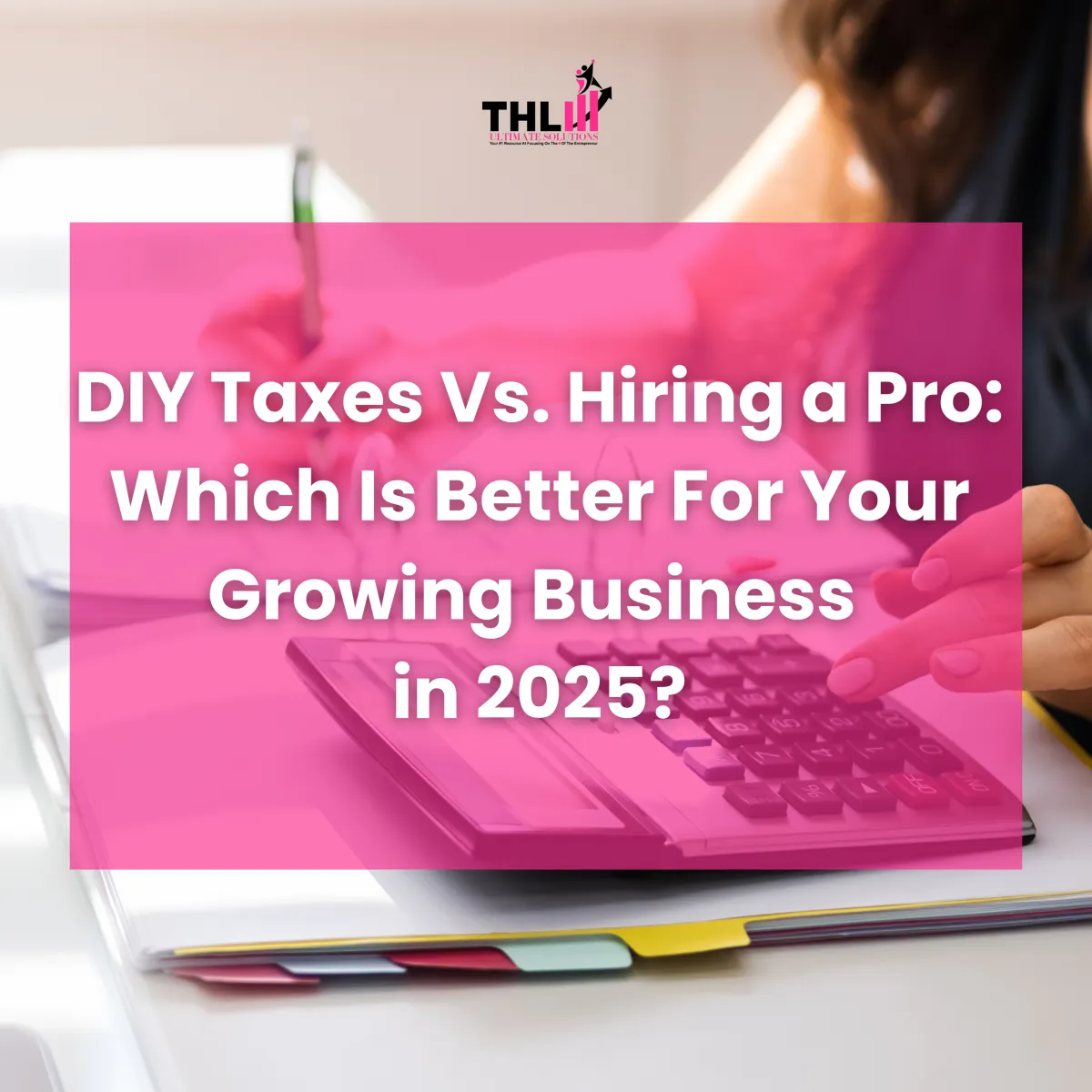
DIY Taxes Vs. Hiring a Pro: Which Is Better For Your Growing Business in 2025?

Tax season is rolling around again, and if you're a busy entrepreneur or single mom running a growing business, you're probably asking yourself the same question we hear all the time: "Should I tackle my business taxes myself or hire a professional?"
It's a fair question, especially when you're juggling a million other things. Between running your business, managing family life, and trying to squeeze in some self-care (we see you!), tax prep can feel like just another overwhelming task on your endless to-do list.
The truth is, there's no one-size-fits-all answer. What works for your neighbor's boutique might not work for your consulting business. But here's what we can do, break down both options so you can make the best choice for your situation in 2025.
The DIY Route: When Going Solo Makes Sense
Let's start with doing it yourself. There's something appealing about maintaining control over your financial information and saving some cash in the process, right?
The Money Factor
The biggest draw to DIY tax prep is obviously the cost savings. Most tax software runs between $50-$150 for business versions, compared to potentially thousands for professional services. When you're bootstrapping a growing business, every dollar counts.
You're in the Driver's Seat
With DIY, you set the timeline. No waiting for appointments or rushing to meet someone else's deadline. You can work on your taxes at 2 AM in your pajamas with a cup of coffee (or wine, no judgment here).
Learning as You Go
Here's something many entrepreneurs don't consider: doing your own taxes teaches you about your business in ways you might not expect. You'll become more familiar with deductions, understand cash flow patterns, and get a clearer picture of your financial health.
But Let's Keep It Real
DIY isn't all sunshine and tax savings. It takes time, lots of it. And if you're already stretched thin managing your business and family, adding 20+ hours of tax prep to your plate might not be realistic.
The learning curve can be steep, especially if your business is growing and becoming more complex. One missed deduction or filing error could cost you way more than professional fees would have.
When DIY Works Best:
Your business has straightforward income and expenses
You're comfortable with technology and learning new software
You have the time to dedicate to proper preparation
Your tax situation hasn't changed much from last year
Hiring a Professional: When It's Worth the Investment
Now let's talk about bringing in the cavalry: a tax professional who knows the ins and outs of business taxes.
Peace of Mind is Priceless
There's something to be said for handing over your tax documents and knowing they'll be handled correctly. As a busy business owner (especially if you're a single mom), peace of mind might be worth the cost.
They Know the Latest Changes
Tax laws change constantly, and 2025 brings several updates that could impact your business. A good tax pro stays on top of these changes so you don't have to.
Maximizing Your Deductions
Professional tax preparers often find deductions you might miss. They ask the right questions and know which expenses qualify for business write-offs that could save you serious money.

The Support System
If the IRS comes knocking (which happens more than you'd think), your tax professional will be there to help navigate the situation. Try getting that level of support from tax software.
The Reality Check
Professional tax services aren't cheap, especially for business returns. Depending on your business complexity, you could be looking at $1,000 to $5,000 or more. For some growing businesses, that's a significant expense.
You'll also need to work around their schedule, which can be challenging during busy tax season when everyone needs their services.
When Professional Help Makes Sense:
Your business has multiple revenue streams
You have employees or complex business structures
You're dealing with inventory, depreciation, or significant asset purchases
You simply don't have the time or mental bandwidth
You want someone to blame if something goes wrong (kidding, but not really)
What's Different in 2025?
Several tax changes for 2025 could impact your decision:
The standard deduction amounts have increased, which might affect how you approach itemizing. There are also updates to retirement plan contribution limits and some business expense rules that could impact your planning.
If you're using the Section 199A deduction (the 20% pass-through deduction), there are nuances in 2025 that could benefit from professional guidance, especially as your business grows.

The Sweet Spot: A Hybrid Approach
Here's what we often recommend to our clients: Consider a consultation approach. Meet with a tax professional once to review your situation and get their input on whether DIY is realistic for your business.
Some entrepreneurs use professionals for business taxes but handle personal returns themselves. Others do their own taxes but pay for a professional review before filing.
Making Your Decision: Questions to Ask Yourself
Time Reality Check:
How many hours can you realistically dedicate to tax prep without sacrificing business growth or family time? Be honest here: it's usually more time than you think.
Complexity Assessment:
Has your business gotten more complicated since last year? New revenue streams, employees, significant purchases, or changes in business structure all point toward professional help.
Risk Tolerance:
How would you handle an IRS notice or audit? If that thought keeps you up at night, professional help might be worth the investment.
Growth Stage:
If your business is in a rapid growth phase, the time you'd spend on taxes might be better invested in business development. Sometimes paying a professional frees you up to make more money than you're spending.
Bottom Line: What We Recommend
For most growing businesses, especially those run by busy entrepreneurs and single moms, we lean toward professional help. Here's why: your time is valuable, tax mistakes are expensive, and peace of mind matters.
That said, if your business is relatively simple, you're comfortable with tax software, and you genuinely have the time to do it right, DIY can work.
The key is being honest about your situation. Don't let pride or budget constraints push you toward DIY if your business complexity calls for professional help. And don't assume you need a professional if your situation is straightforward.
Ready to Make the Right Choice for Your Business?
Whatever route you choose, make sure you're making an informed decision based on your specific situation. If you're still on the fence, consider scheduling a consultation to discuss your options.
For more business and tax insights, check out our comprehensive courses at the THL Online Learning Center. You'll find practical guidance for growing your business while managing all of life's demands.
Want to dive deeper into business financial strategies? Grab a copy of my book on Amazon for actionable insights you can implement right away.
Ready for personalized guidance? Access additional resources and tools at tabitha.thlonlinelearning.com/Tabithalewis to help you make the best decisions for your business and family.